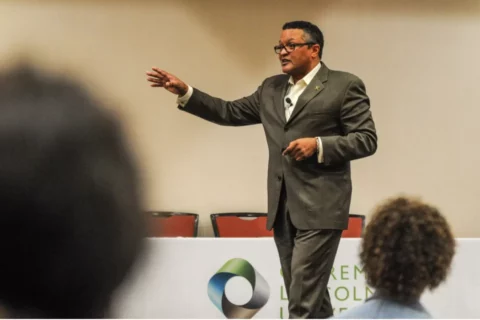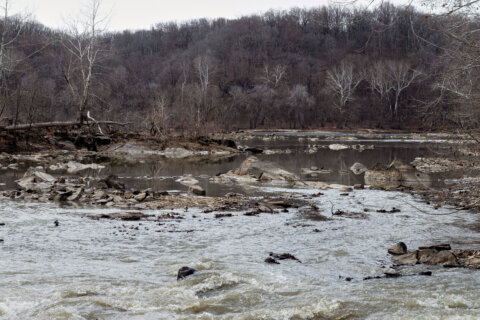Building a new bridge across the Potomac River would cost too much money and protected farmland on the Montgomery County side, County Executive Marc Elrich said Monday.
Amid attempts to facilitate resuming service of White’s Ferry, and discussion of a new river crossing, Elrich was asked by WTOP for his vision of how best to connect Montgomery County’s technology corridor and newly built housing along I-270 in the upper county, and Loudoun County’s ongoing development along the Dulles Toll Road and Greenway.
“That’s a complicated question,” said Elrich, given the long distances some commuters travel. “Best for who, and at what expense to everybody else?”
Elrich and the county council have long opposed a new Potomac River bridge, and said the regional Transportation Planning Board considered whether it would be a game-changing project.
“It was not evaluated as being effective, and I still don’t personally think it’s the best use of money,” Elrich said.
“Loudoun’s situation is different from ours. They basically built up the river. You can go stand on somebody’s farm in Montgomery County and look across the river and see buildings. If you were in Virginia and looked across the river, you see farms. So any road built over here goes ripping through the [agriculture] reserve,” Elrich said.
In recent years, Loudoun County’s Board of Supervisors have developed plans for where a new bridge could cross the Potomac. On the Loudoun County side of the river, the hope is it would connect with the well-developed Loudoun County Parkway or Route 28 corridors.
With the completion of Phase 2 of the Metro Silver Line extension project, Metro will soon provide a way for commuters to avoid using their cars between each county’s growth centers. However, riding from the end of Metro’s Red Line at the Shady Grove Station, in Montgomery County, to the end of the Silver Line at the Ashburn Station, in Loudoun County, would take more than 90 minutes.
“It is a long commute,” Elrich said. “The smartest thing for people to do is not live so far away from work.”
“This idea that the rest of us have to accommodate and pay for massive projects because somebody likes the idea of living 50 miles away from where they’re working, that’s a bit of an imposition of costs and environmental burdens on everybody else, because of somebody’s preference for lifestyle in one place or the other,” said Elrich.
Elrich has been a critic of Gov. Larry Hogan’s plan to approve toll lanes from I-270 in Gaithersburg to the American Legion Bridge. Last week, Maryland’s Transportation Authority Board approved toll rates for the stretches of the Capital Beltway and I-270.
‘We certainly should be able to do this’
While Loudoun County supervisors have encouraged the owner of White’s Ferry and landowners on the Virginia side of the Potomac to negotiate a solution, talks appear to be at a stalemate. The ferry ceased operations in December 2020.
“We certainly should be able to do this,” Elrich said. “This thing has operated since the 1700s; people have gone back and forth. It’s hard to believe in the 21st century we can’t figure out how to get it back on track.”
Elrich agreed with Loudoun County Board Chair Phyllis Randall that a mediator should be called in: “Too bad you don’t have some kind of arbitration where both parties have to sit in room and let the arbitrators hear both sides and let a rational person decide what’s a fair price.”
Unlike Randall, Elrich said he would consider using eminent domain to purchase the farm where the landing is: “If this were my problem, on my side of the river, and I knew this was the only way to get this resolved, I’d resolve it that way.”
Asked how a ferry carrying only 800 passengers per day across the Potomac constituted an important transportation corridor, Elrich suggested White’s Ferry’s passenger volume alone isn’t the only consideration.
“It doesn’t make or break either of our counties economically, but it is an enormous inconvenience to people (to have the ferry not operating), and one that we had solved for 300-plus years,” Elrich said.
“If nothing happens, both sides lose. The ferry operator doesn’t ever get any revenues. The farm, which is trying to get more revenue, ends up with zero revenue,” Elrich said. “It’s not a solution where anybody walks out winning if everybody gets stalemated — it doesn’t increase the value of the farm over there, not to have the ferry.”








